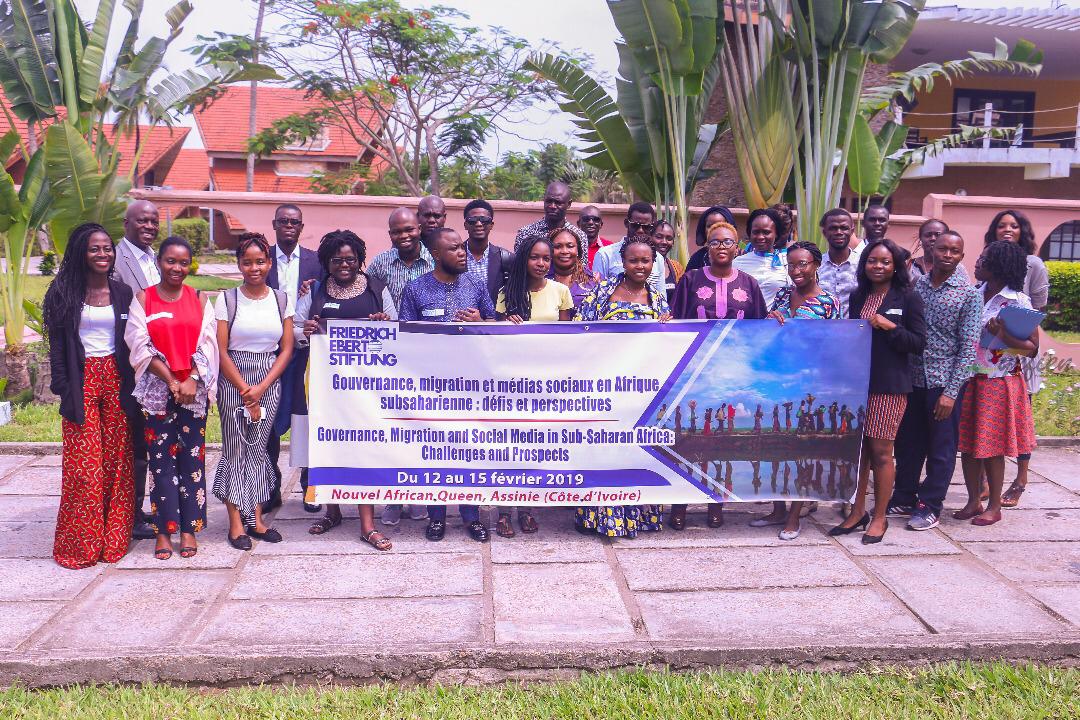Friedrich Ebert-Stiftung funded and organized a seminar from, 12-15 February 2019, in Assinie, Ivory Coast on the theme, “Governance, Migration and Social Media in Sub-Saharan Africa: Challenges and Prospects.” They invited over 20 participants from West Africa and Cameroon and we, Shari Raji and Gerald Hodges, were selected to represent Liberia, and Sleepless in Monrovia. The workshop was intended to empower internet actors, especially bloggers, in promoting legal migration. Governance and Migration are quite complex topics to discuss, however, below is a summary of our key takeaways from the workshop.
As defined by the International Organization for Migration, migration is “the movement of a person or a group of persons, either across an international border, or within a State. It is a population movement, encompassing any kind of movement of people, whatever its length, composition and causes; it includes migration of refugees, displaced persons, economic migrants, and persons moving for other purposes, including family reunification.”
Quite recently, the number of migrants across the world have exponentially increased drawing the attention of policy makers. The International Organization for Migration reports that there are 1.1 billion migrants in the world and out of those, 140 million migrated internally while 230 million migrated out of their original continent. In Africa, approximately 90-95% of the migration is within the continent. These figures show that migration is a deeply rooted human trait; it is not something that can be curbed easily. Throughout human history, migrants have fueled human progress; the movement of people sparked innovation, spread ideas and technologies, reduced poverty and inequality, and laid the foundations for today’s globally interconnected economies. However, if not well organized, migration becomes harmful to both the countries and the migrant. For example, depopulation and loss of labor force in especially rural areas, overpopulation in urban areas which leads to increased competition for jobs and cost of living, migrants exploitation, etc.
Why is illegal migration, and mass legal migration, a concern?
Most Liberians know of folks who have migrated, especially as a result of the 14-year Civil War. Others migrated in search of better opportunities, loved ones, or simply because they felt the desire to. One may argue that moving from one point to another (migration) is a basic human right – this we don’t dispute. However, illegal migration and the means through which people migrate illegally is dangerous, hence must be curtailed.
To migrate illegally means to travel to another region without firstly following the prerequisite immigration laws of that region that or, to overstay/misuse the visa legally issued you. People usually migrate in this manner when they believe that the living conditions of the country they envision migrating to are better than the ones of the country they currently reside in.
Illegal Migration in Africa happens largely from Northern Africa to Europe. People from all over the continent leave their homes and trek across the continent to enter Europe through Libya or Morocco. In 2017, more than 132,000 migrants and refugees crossed the Mediterranean to land in Europe — all of them facing huge risks along the way. More than 2,300 humans drowned in rickety boats trying to successfully complete the treacherous journey across the Mediterranean, from Libya to Italy- and for those who make it across but are sent back, there have been vile report of them being sold into modern-day slavery right there in Libya. There are stories of “The Land Between”, a patch of land between Morocco and Spain where scores of Africans go and attempt to climb the wall that separates the continents. These men, women and children are violently beaten and killed by the Moroccan guards in order to prevent them from trying or trying again.
So, why do it? After knowing all these horrible things, what causes a person to still take the risk? Well, poor governance, improper policies, and a downtrodden economy are some reasons that push people to risk their lives and liberty in search of “better.”
The problem with this search is that majority of the people who embark on these journeys end up suffering in ways you couldn’t imagine, and the very few that make it spend the rest of their lives in perpetual fear of getting caught and deported by the authorities. There is a person who tried to migrate illegally to Italy through Libya and after failing 99 times, he still got up to try for the 100th time. When asked why, he said, “at least when I’m here trying, people back at home don’t know I haven’t made it yet. At least I’m not yet a disappointment to my family.” There’s an Ivorian saying that roughly translates to, “I’d rather drown in the sea than see my mother cry” and that perfectly captures the mental prisons we’ve been forced into simply because of how we have been brainwashed to see “The West.”
However, illegal migration isn’t the only issue though, legal migration can be problematic. Take for example a person who left Liberia after winning the Diversity Visa (DV) and is now doing manual labor to survive in America. She knows that she can have a much better life back here in Liberia but when asked why she doesn’t try coming back, she says her family has forbidden her from “intentionally bringing shame to their name.” This is a more common phenomenon than you think. A lot of Liberians believe that suffering in America is much better than living more comfortably in Liberia.
My people, suffering is suffering oh! It’s much better to stay at home and try to make your way in this country than to go and do manual, backbreaking jobs in a country that will never fully embrace you.
In life, we try different tactics and opportunities as we don’t know what will work out best for us, but there is a stigma or shame attached to closing the chapter on a venture that needs to end. If you have migrated because you thought the opportunities in the other region would be better than where you were previously, and that turned out to not be the case, there is absolutely nothing wrong with deciding to go back home and trying there. It’s not a failure, it’s simply a change of course.
It is all easier said than done, though. As a country, we have to get better at keeping and/or bringing our citizens home. But, how?
Part two of this piece continues on 2/28/19.
Authored by Shari Raji & Gerald Hodges


One Comment